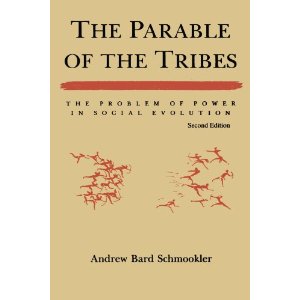At this point, let me tell the readers that Jack Miles is the author of a wonderful book, God: A Biography. Fortunately, I'm not the only person to appreciate that book: the book was awarded the 1996 Pulitzer Prize for "Biography or Autobiography." (Presumably, the committee did not regard it as an autobiography. J )
So, do you have any thoughts about why The Parable of the Tribes did not receive such honors? No one would expect the people on a committee that could award such prizes as the Pulitzer to take on such an immense and unlikely task as you describe. They'd just have to say, as they rightly did with your book, "Hey, this is good!" and then go home and resume their lives.
(The P of T did get honored by the International Society for Political Psychology, so it did not go entirely without laurels. But I should perhaps add that there is one person who mostly made that happen--because of the intensity of his enthusiasm, and his standing in that rather small community.)
Any thoughts?
Oh, and here is that cover you wanted people here to see. (It was Jack, by the way, who located this graphic--after we'd spent several months looking for something appropriate.) As for the "parable" itself, it will be included in the next installment--whose title is going to be the same as the book's.
***************************
Ed Schmookler:
1). I do think it is a big deal.
2). You've raised the question of why The Parable of the Tribes was not refuted, nor adopted, but just ignored. From the standpoint of the big picture that you see, are there features of the way civilization has developed, as The Parable of the Tribes describes, that would prevent people from noticing what you are saying?
In my work as a Psychologist, for example, I find that people raised in a tyrannical household are usually highly discouraged from seeing the tyranny in their household as being about the parent rather than themselves. They are also discouraged from voicing their perception of tyranny. Instead, they are made to feel inadequate and not to trust what they see, and not to look. You can see this in the current Trump staff, and he is trying to impose that on the rest of the people -- journalists, protestors, etc.
In other families, organized around authority, when it is a milder form of parental authority, the organization of the family may benefit them enough not to want to challenge it. Similarly, at a political level, it may be that Liberals benefit enough from the structure not to want to challenge it -- unlike poor people, for example.
So do you have an understanding, based on the Big Picture, of why people have not seen what you are saying?
3) I wonder if you could expand on a point you are implying:
You are saying, I believe, that if only people would understand the Big Picture, they would be relieved not only of ignorance but also of suffering. Specifically, you say or imply that currently people see part of our nature as destructive -- the bad parts of humanity. I believe you are also saying that the viewpoint in you Big Picture, spelled out in the Parable of the Tribes, is that the destructive parts of human manifestation are not parts of our nature but the result of the evolution of civilization. Can you say more about the suffering you are attempting to dispel?
Andy Schmookler:
Next Page 1 | 2 | 3 | 4 | 5 | 6 | 7 | 8 | 9 | 10 | 11 | 12 | 13 | 14
(Note: You can view every article as one long page if you sign up as an Advocate Member, or higher).






